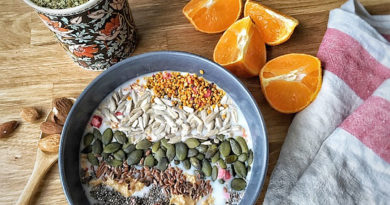The Cornerstone of Health is Good Digestion
In Ayurveda and Functional Medicine we proclaim that the cornerstone of health is good digestion. Our brains are hardwired to overvalue danger in order to keep us safe. This means that unless your tummy hurts or something is not right, you rarely give any thought to good digestion. In behavioral economics it has been shown that we are more likely to make choices that insulate us from loss. This is why it is so hard to give up bad habits, because we perceive it as a loss of something that once belonged to us. In a study on the endowment effect, participants were asked to value coffee cups and then they were given the same cups and asked how much they would charge someone else for the cup. Researchers found that once something belongs to someone, they place an increasing value on it. We tend to value what belongs to us even if that thing is not working or belonged to someone else two seconds ago. These irrational behaviors can get in the way when it comes to keeping your digestion running strong.
The digestive system in humans is small compared to our mammalian relatives, but if laid out flat it would cover the surface of a football field. That is a large amount of surface area packed into a small space and it creates the multilayered complexity that allows it to be effective. Most of us are aware of the entry and exit points of the digestive system: mouth and anus. It is what happens in between that can be confusing. Don’t despair, we will explore some tools you can use in order to become more aware of what is happening in your digestion and look at suggestions for keeping your digestion strong.
Constitutionally Appropriate Diet

There is no “one size fits all” diet. The ultimate goal of every diet is to choose foods that your body digests easily and that bring you energy and vitality and minimize foods that compromise digestion.
There is no one size fits all diet. The word diet does not do justice to how unique and individualized we each are. The ultimate goal of every diet is to choose foods that your body digests easily and that bring you energy and vitality and minimize foods that compromise digestion. This can be achieved in many different ways, and each dietary strategy has its benefits and shortcomings. While utilizing diets such as Paleo, autoimmune Paleo, Specific Carbohydrate Diet (SCD), GAPS diet, and low FODMAP (Fermentable Oligosaccharide, Disaccharide, Monosaccharide and Polyols) may provide benefit for 1-2 years, humans do best with diversity, and so such restrictive diets have a shelf life.
The reality is that you will probably use each of these diets over the trajectory of your life as they each work for different digestive imbalances. For example if you have intestinal dysbiosis which is when bad bacteria, yeasts and virus have outcompeted the probiotics in your intestines, leading to fermentation, you will want to follow a FODMAP and SCD diet. The feeling of more gas, more bloating and alterations in fluid and gas absorption in the intestine will stop as you stop feeding the bad bacteria with certain foods and promote healing. Good and bad bacteria feed on the same fuel. Once a healthy gut ecosystem has been established, you will want to introduce those foods again in order to feed the good bacteria.
If you don’t know which of the many choices to choose I recommend determining your imbalance with Ayurveda and following a constitutionally appropriate diet while minimizing your consumption of common food such as dairy, sugar, gluten, soy, nightshades and food preservatives. This is a pretty limited diet and it does require time and detective work, but the data you get about yourself is worth every second and inconvenience. Go slowly and once you arrive allow yourself at least 4 weeks with these changes to see if this is the right choice for you. You can take this approach with any dietary strategy in order to get useful information.
Stoke your agni
Agni is your digestive fire, which is your body’s ability to break down protein, carbohydrates and fats into the building-blocks that the body uses, such as amino acids, starches and fatty acids. Agni refers to the use of stomach acid, digestive enzymes and bile to break food down into particles that are a precise size that can be absorbed by the body. If the food is not adequately broken down, it creates ama, which means undigested food particles. In Ayurveda, ama is the primary cause of all disease, it is what will lead to the three primary types of digestive disturbance:
- Gas and bloating
- Inflammation or hyperacidity
- Sluggish digestion
All forms of digestive upset are basically a more severe variation of one of these symptoms. In Western medicine, the most well researched condition is that of inflammation. Inflammation occurs when the immune system uses inflammation in the digestive system to break down the ama. Although this response is normal, if it becomes a chronic response then it can lead to food sensitivities, leaky gut and autoimmune diseases. While a constitutional appropriate elimination diet may reduce inflammation by reducing ama, there are instances where even hypoallergenic food can cause IBS, gas, bloating, spasm, cramping and indigestion, because it is not being broken down and it is creating ama. In Ayurveda well-spiced food with antioxidant rich spices like cumin, coriander, fennel and turmeric is a common approach for removing ama and igniting agni.
Let the Microbiome Flourish
Within your digestive system is an entire continent populated by over 100 trillion cells, primarily bacteria. Most of them have established a symbiotic relationship with your body and perform functions in your digestive system that your body is unable to do. Like any city, with so many people there are some bad bacteria that can cause high crime rates when there is a high concentration of them. In order to maintain health, the balance of the gut flora should be restored. There are two parts to this process. The first part is taking natural antimicrobials to put the bad guys in jail and allow the good guys to flourish. In nature, nothing is black and white and although I am using a good guy, bad guy analogy it is only a metaphor. Once the good guys start to get the upper hand, then probiotic supplements or probiotic rich foods can be used to enhance the health of your microbiome. Not everybody tolerates probiotics. When you get to step two, follow this approach:
Start Low, Go Slow
The easiest way to do this is to use powdered probiotics and begin with a pinch on day one and slowly increasing your pinches until you are taking about 50-100 billion (Colony Forming Units) CFUs per day. Food based probiotics like kefir, miso, and vegetable ferments are also a great way of getting daily probiotics.
In addition to this make sure that you chew your food well. Also encourage lot’s of vegetables I your diet as that is the primary fuel for your friendly bacteria. If you want more information check out my Ayurvedic Guide to Fermenation Ebook.
Support the Food Tube
The digestive system is a continuous channel with the skin, so although it seems as if it is inside of us, it is actually a layer similar to the skin that it separates us from the outside world. When the tube is damaged by things such as ulcers, leaky gut, gastritis, diverticulitis, and others, then the whole body can be affected.
The protective layer of the lining of the GI tract is like a castle in that the gates are only opened for the nutrition that the body needs. When the gates are opened indiscriminately, this is called leaky gut. Like a bucket with a hole in the bottom, healing the lining of the intestines is primary because until then all the other inputs will not be held within the body. A few suggestions of herbs and supplements that can be used to restore the lining are:
- Bone broth, recipe here
- Collagen, buy it here
- Turmeric
- Glutamine (3-9g/daily)
- Zinc Carnosine (100mg twice daily)
- Slippery Elm
- Marshmallow
- Licorice
Stress Management
The gut is often considered the second brain, because of the number and amount of neurotransmitters that are produced there. How we cope with stress will determine how our belly’s feel on a daily basis. Remember it is not the stress itself, but your perception of the stress that will determine how you respond. Even if you are in a bad relationship, have a crappy boss, suffer from tight deadlines, can’t make time for yourself, feel dissatisfied or unworthy, your perception of control in the situation will determine stresses effect on you. Regardless of whether you are in control or if there is anything you can do, research shows that if you perceive there is something you can do, then you will be more optimistic, resilient and emotionally mature. The stress doesn’t go away, but how you respond to it and it’s affect on you changes significantly.
Within the gut is a plexus of nerves forming the enteric nervous system. This is your gut brain and it is independent of the central nervous system like neighbor on the same street. It may take input from the CNS, but it can act on it’s own. When you perceive yourself as stressed, then your ability to produce adequate digestive enzymes, acid and bile to appropriately break down your food into easy-to-absorb particles is compromised. This can lead to a breakdown of the lining of the small intestine, which is a major site of absorption of nutrients leading to a compromised microbiome – the collective of 100 trillion healthy, beneficial bacteria.
So this is what it means to have good digestion:
- Production of adequate digestive enzymes, acid and bile
- Intact and healthy small intestine lining
- Robust Microbiome
- Well Coordinated gut motility.
In order to reduce how stress affects your gut, take five long deep breaths before and after meals. This will help you to slow down the mind and become intentional about receiving the nourishment from your food. I have mentioned that digestion is the cornerstone of health. In the following section I will discuss the myriad of other roles it does to keep you in optimal health.
Immune System
As mentioned earlier, the digestive system is protective barrier and it works in collaboration with the immune system in order to defend the body. Defense deployment begins in the stomach where acid with a pH of 1-2 (the rest of your body is about 7) breaks down harmful bacteria, parasites, yeast and fungus. If these dangerous bugs make it through the first line of defense, the beneficial bacteria in the microbiome will actively seek them out and dispose of them. More than anywhere else in the body, immune cells such as macrophages and killer T cells are present in the gut, ready to defend the body against non-symbiotic foreigners. Immune health depends on a healthy gut and vice versa.
The Endocrine System and Hormones
Within the body is a system of aqueducts that carry information and nutrition to the body. Glands secrete chemical messengers in the form of hormones in order to communicate and coordinate actions to maintain ease in the body. Hormones generated within the gastrointestinal system are insulin, glucagon and leptin. Not only does the digestive tract produce these hormones that manage blood sugar and feelings of satiety, it also breaks down, recycles and excretes used and spent hormones. The break down and recycling is mainly achieved in the liver and the excretion in the large intestine. As digestion is improved, symptoms like acne, menstrual irregularities, low libido, bloating, headaches, irritability and other related to hormones are improved.
Detoxification and Cleansing
We are all exposed to a large number of chemicals on a daily basis, and it is the job of the large intestines, kidneys and liver to neutralizing and excreting hundreds and thousands of harmful compounds. If your digestion is not optimized, then these can bio-accumulate in the tissues and cause problems in every system in the body. This could be the primary reason why systems like Ayurveda believe that digestion is paramount.
Mind and Brain
As digestion is not under your voluntary control, it requires a collection of nerve cells equal to the number in your spinal cord to coordinate all aspects of digestion in real time. The enteric nervous system as it is called is separate from the central nervous system because it is necessary for survival and will not be shut down if the spinal cord is damaged.
Although digestion is well understood, the full extent of effects it has on the entire body is still being explored. This is because every cell in your body depends on the nutrition that is created and assimilated in the digestive system. The mind and brain are mainly involved in disorders that affect the function of the digestive system and has a smaller impact on the structure. For example, IBS can be exacerbated by stress, while ulcerative colitis, which is more structural, is not as strongly correlated with stress.
Strategies
Everyone’s diet is individualized, and while some people are sensitive to gluten or casein, others thrive on them. Modern research and ancient practices have found some general trends that will be explored below.
- Avoid the most common food allergies.
Research points to gluten, casein, soy and sugar creating overgrowth of bacteria and inflammation. Although I don’t advocate long term restriction of these foods, if you have any digestive symptoms it can be useful to avoid them. - Eat 75% veggies.
For about four weeks make sure that 75% of your meals are vegetables. Once you have established this trend, you can start to play with the individual veggies – they will often correspond to the Ayurvedic diet that fits your unique individual. - Eat mineral rich foods.
Our colon depends on minerals absorbed in water for its optimal function. Foods high in minerals are green leafy vegetables, celery, bee pollen, bone broth and potassium broth. - Stay hydrated.
Reduce or eliminate alcohol, soda and coffee. Drink about half your body weight in ounces of water. If you weight 150 pounds drink 75 ounces of water a day.
The most common strategy these days for building digestive fire is to take enzymes. Enzymes like protease, amylase, lipase, trypsin, hemicellulose and others may help in the short term, but they are not teaching your body how to digest food they are doing it for you which can lead to dependency long term.
More sustainable strategies are using raw, unpasteurized apple cider vinegar. You can use it in salad dressing or make the ACV Elixir below.
ACV (Apple Cider Vinegar) Elixir
- 1 Tablespoon raw, unpasteurized apple cider vinegar
- 5-7 drops of lemon flavored stevia or stevia and fresh lemon juice
- 10 ounces of water
- Optional: 2-4 ounces of aloe vera juice
- Pinch of powdered ginger
Mix all ingredients and serve. Best drunk in the afternoon or evening.
Also increase your intake of fermented foods like water kefir, kombucha, sauerkraut, kimchi and yogurt.
The last strategy is to eat a ginger pickle before dinner.
Ginger Pickle
- 2” Fresh grated ginger
- 1/2 Lemon juice
- 1/4 tsp Rock salt
- Honey to taste
Take one teaspoon a few minutes before you eat to increase your digestive fire. Or make a larger quantity and keep for next meal.
By employing these strategies, the ecology of your digestive system will change. Like the forest after a wildfire (inflammation), the lining of the small intestine will re-establish it’s good, solid integrity. The GI tract will become more adaptive and your reaction to hard to digest foods will decrease. Over time you will be able to correct dysbiosis, soothing an irritated intestinal lining and improving the overall function of the gut.
In addition to foods, it is also important to manage your stress levels. The CNS is connected to the enteric nervous system through the autonomic nervous system (ANS) which is responsible for involuntary actions like heart rate, breathing, core temperature, desire, etc.
There are two branches of the Autonomic nervous system: sympathetic and parasympathetic.
Most people have heard of the sympathetic branch, as it relates to the fight or flight response and releases stress hormones in order to sharpen your reflexes and senses and help you save your life by either fighting or fleeing. These days, mortal threats are rare and the rush of adrenal hormones come from daily occurrences such as arguments, deadlines and mind-numbing work.
The parasympathetic branch has the opposite functions and is responsible for healing, repairing damaged tissue, immune function, and digesting. When this branch is functioning well, digestion and motility are balanced. The parasympathetic function also regulates the amount of hormones that are made, recycled and repaired. When this system is functioning well, you release feel-good hormones. It is largely responsible for hedonistic pleasures and connect our frontal cortex, consciousness, gratitude, connection and higher-level cognition, which keeps us smart, sharp, connected, flexible and creative.
In a perfect world, the sympathetic and parasympathetic are balanced, but for most of us the sympathetic responds to our constant stress, and our digestion suffers. The imbalance in the see-saw because of sympathetic overdominance. Thus balancing the autonomic nervous system is equally as important as all the dietary and herbal recommendations.
The primary way to accomplish this is to find beneficial ways to de-stress. No, drinking, recreational drugs, watching movies and overeating are not the answer. Here are a few strategies that can help.
Sleep:
We replenish ourselves with sleep. This is one of the primary ways that we activate the autonomic nervous system. Some strategies for improving your sleep are to go to bed at the same time each night. Every hour of sleep before midnight is equal to two after. Some nights you may need to vary things, but minimize the variation to 90 minutes. The bedroom is best used for only sleep and sex, so minimize light and electronics and maintain a level of cleanliness. The light from electronic screens can disrupt sleep. Having a flashing rectangles lights out time that is at least 30-60 minutes before bed, will help. Have routines that include a warm bath and enjoyable books or music.
Chew:
Digestion starts in the mouth and so the activation of the ANS can begin there. If you are distracted by standing up, your laptop, phone and books. The more time that you take in order to be mindful of the process of eating and the smells and textures. There is no magic number of times to chew, but make sure that each bite is a soft paste. Take your time.
Leisure Walks:
A simple way to reducing stress, improving imagination and creativity are to take walks. They don’t have to be long as little as five minutes can have a powerful effect on the body and mind. The key to this strategy is just like chewing your food. Like minding our table manners above, leisure walking also balances the parasympathetic nervous system. Go for a 15-60 minute walk several times a week. If you can do it every day, so much the better. Be mindful of this walk as you are of your food. Notice what is around you. Feel the sun, or the lack of sun. Feel the air on your face. Look at the trees, the plants and flowers around you. Hear the birds, the traffic, the people and interruptions around you. When your mind wanders to how much you have to do when you get back from the walk or how messed up person/situation xyz is, bring your attention back to this: the walk, your feet connecting to your shoes connecting to the Earth, the sun, the birds. Make it a walking meditation. We get good at what we practice, what we rehearse mentally. If we chew on stress, we get good at stress (we are all pros, right?!?). We can practice a new way to be.
Unplug:
For at least 5 minutes each day, step away from electronics, emails and schedules. Whether it is to go outside for a minute, close your door at work, or lock yourself into a bathroom stall, step away from the stream of ceaseless activity and just be. The stream, all the stress, will be there for you when you get back.
Mindset Shift:
If I told you that your thinking could be contributing to your symptoms, you may call me crazy, right? Hear me out. Negative thoughts create negative emotions. Negative, stressed out emotions, what do they do? They release stress hormones (trumpets please, you are activating your fight-or-flight branch). Stress hormones, well, know you have an education on what they do to your gut. Often, our stress and negativity comes from our perceptions, the way we look at things. How we frame them. There is a mountain of research into the field of positive psychology, and how by re-framing situations to highlight the positive, show gratitude, find the lesson or the silver lining and giving others the benefit of the doubt increase not only happiness and better self-awareness but reduce physical symptoms. This, friends, is exciting. It means you have control, that you can do something about YOU. I’ve put together a little reading list for you guys that are interested in his. It is truly a life-changer:
The Happiness Advantage: Sean Achor
Loving What Is: Byron Katie
The Biology of Belief: Bruce Lipton
The Power of Now: Eckhart Tolle
The Untethered soul: Michael S. Singer
The Obstacle is the Way: Ryan Holiday
Conclusion
Thank you for taking an interest in your health and for reading this post. I hope that you got some new ideas that will guide you on your journey towards health. If you would like to be notified of my next post, please subscribe to my newsletter.




